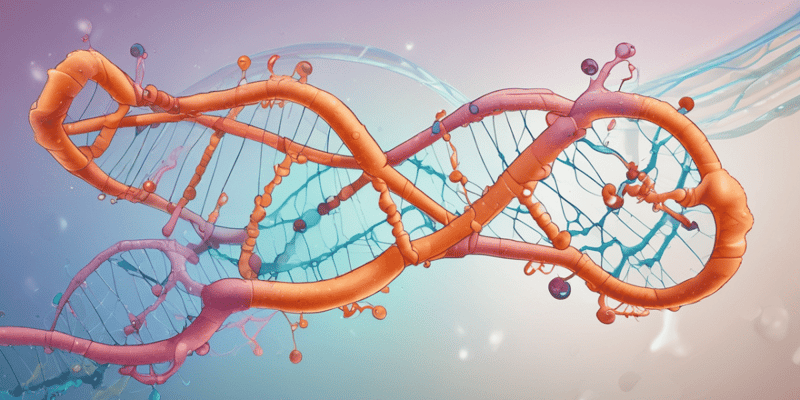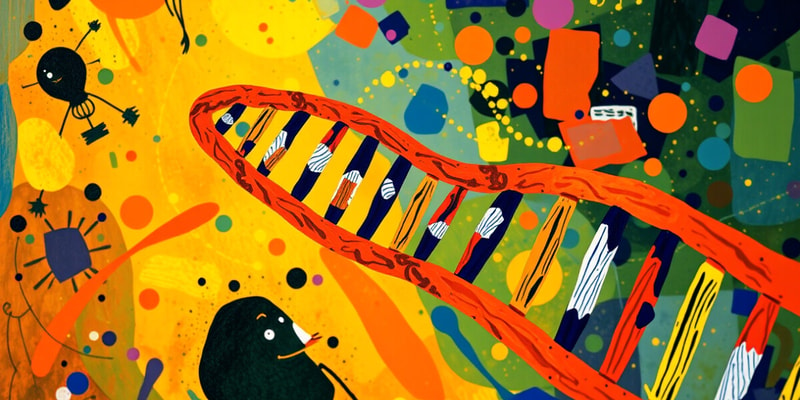Podcast
Questions and Answers
What defines the difference in the type of mRNA produced in prokaryotes compared to eukaryotes?
What defines the difference in the type of mRNA produced in prokaryotes compared to eukaryotes?
Which element is crucial for the low-level transcription of a eukaryotic gene?
Which element is crucial for the low-level transcription of a eukaryotic gene?
In eukaryotic gene expression, what is the role of enhancers?
In eukaryotic gene expression, what is the role of enhancers?
During early cellular development, eukaryotic promoters are described as being what?
During early cellular development, eukaryotic promoters are described as being what?
Signup and view all the answers
How do introns affect the coding region of eukaryotic genes?
How do introns affect the coding region of eukaryotic genes?
Signup and view all the answers
What distinguishes the regulation of eukaryotic gene expression from prokaryotic gene expression?
What distinguishes the regulation of eukaryotic gene expression from prokaryotic gene expression?
Signup and view all the answers
Which of the following statements is true regarding eukaryotic core promoters and their surrounding elements?
Which of the following statements is true regarding eukaryotic core promoters and their surrounding elements?
Signup and view all the answers
What is a common feature of the promoters found in the human genome?
What is a common feature of the promoters found in the human genome?
Signup and view all the answers
What is the primary role of CPSF in mRNA processing?
What is the primary role of CPSF in mRNA processing?
Signup and view all the answers
How does alternative splicing increase the diversity of proteins?
How does alternative splicing increase the diversity of proteins?
Signup and view all the answers
What is a consequence of mRNA processing in eukaryotic cells?
What is a consequence of mRNA processing in eukaryotic cells?
Signup and view all the answers
What is the size difference between eukaryotic and prokaryotic ribosomes?
What is the size difference between eukaryotic and prokaryotic ribosomes?
Signup and view all the answers
Where does translation primarily occur in eukaryotic cells?
Where does translation primarily occur in eukaryotic cells?
Signup and view all the answers
What does polyadenylation do to the mRNA molecule?
What does polyadenylation do to the mRNA molecule?
Signup and view all the answers
What is the role of introns during mRNA processing?
What is the role of introns during mRNA processing?
Signup and view all the answers
What can be inferred about the DSCAM gene in terms of its splicing capability?
What can be inferred about the DSCAM gene in terms of its splicing capability?
Signup and view all the answers
What is the correct flow of genetic information as indicated?
What is the correct flow of genetic information as indicated?
Signup and view all the answers
Which statement best describes the role of the 5' Cap in mRNA?
Which statement best describes the role of the 5' Cap in mRNA?
Signup and view all the answers
What are housekeeping genes characterized by?
What are housekeeping genes characterized by?
Signup and view all the answers
Which component is found in both prokaryotic and eukaryotic gene structures?
Which component is found in both prokaryotic and eukaryotic gene structures?
Signup and view all the answers
What type of signals regulate transcription?
What type of signals regulate transcription?
Signup and view all the answers
How do aminoacyl-tRNA synthetases function in eukaryotic cells?
How do aminoacyl-tRNA synthetases function in eukaryotic cells?
Signup and view all the answers
What is the significance of the polyadenylylation signal sequence in mRNA?
What is the significance of the polyadenylylation signal sequence in mRNA?
Signup and view all the answers
What are polyribosomes primarily associated with?
What are polyribosomes primarily associated with?
Signup and view all the answers
Study Notes
Gene Expression
- Prokaryotes: Transcription occurs in the cytoplasm, translation occurs in the cytoplasm, mRNA is often polycistronic, 5' UTR and 3' UTR are shorter than in eukaryotic mRNA, no mRNA processing, no introns.
- Eukaryotes: Transcription occurs in the nucleus, translation occurs in the cytoplasm, mRNA is monocistronic, 5' UTR and 3' UTR are longer than in prokaryotic mRNA, mRNA processing with splicing of introns, complex regulatory networks and TADs (Topologically Associating Domains).
Structure of Eukaryotic Gene
-
Core Promoter:
- ~100 bp, contains TSS (Transcription Start Site): TATA box, CAAT box, GC box.
- Binds general transcription factors, resulting in low transcription levels.
-
Proximal & Distal Promoters:
- Up to several Kbp (kilobase pairs) away from the core promoter.
- Enhancers bind tissue-specific transcription factors leading to high expression.
- Insulators bind insulator proteins to define TAD boundaries.
- Silencers bind repressor proteins to inhibit transcription.
-
Active Promoters:
- Are located in nucleosome-free zones.
- Flanking nucleosomes possess active or repressed epigenetic marks.
- During early development, promoters are bivalent/poised and can become active or inactive as the cell differentiates.
-
Mammalian Genes:
- Often have two or more alternate promoters.
- Respond to different regulatory elements.
- Allow the production of protein isoforms.
-
CpG Islands:
- Found in 70% of human promoters and lack most core promoter elements.
RNA Coding Region
- Contains one or more introns.
- Starts with an exon containing the start codon.
- Ends with an exon containing the stop codon.
- RNA transcripts undergo post-transcriptional processing.
- No clear transcription termination sequence.
- Determined during RNA processing: Cleavage occurs 15-30 nucleotides (nt) downstream of the PAS (polyadenylation signal).
mRNA Processing
-
5' Cap:
- Protects mRNA from exonucleases.
- Aids mRNA transport to the cytoplasm.
- Facilitates binding to the 40S ribosomal subunit.
-
PolyA Tail:
- Aids mRNA transport to the cytoplasm.
- Facilitates binding to the ribosome.
-
Intron Splicing:
- Removal of introns from pre-mRNA.
- Promotes export of mature mRNA from the nucleus.
- Prevents degradation of mature mRNA.
Eukaryotic Transcription: Termination
-
CPSF (Cleavage and Polyadenylation Specificity Factor):
- Recognizes the PAS.
- Cleaves the pre-mRNA downstream of the PAS.
-
PAP (PolyA Polymerase):
- Adds a poly(A) tail to the 3' end of the mRNA.
Alternative Splicing
- Different isoforms of proteins can be produced from the same gene.
- Produces diverse protein products from a single gene.
Eukaryotic Translation
- Requires more factors than prokaryotic translation.
- The eukaryotic ribosome is larger than the prokaryotic ribosome.
- Translation occurs in the cytoplasm.
- Eukaryotic translation is highly regulated, particularly at the initiation stage.
- Eukaryotic translation elongation and termination resemble prokaryotic translation.
Eukaryotic Gene Expression - Regulation of Transcription
-
Internal Cellular Signals:
- DNA binding factors (transcription factors).
- Chromatin state (euchromatin vs heterochromatin).
- Transcription machinery (RNA polymerase, general transcription factors).
-
External/Environmental Signals:
- Hormones
- Cellular stress
-
Complex Interplay:
- A complex interplay of internal and external signals governs gene expression.
Regulatory Elements
-
Housekeeping Genes:
- Are constitutively expressed (always on).
-
Other Genes:
- Have specific temporal-spatial expression (regulated expression in specific times and locations).
Prokaryote vs. Eukaryote mRNA
-
Prokaryotic mRNA:
- Polycistronic (encodes multiple proteins).
- Shorter 5' and 3' UTR.
- No introns.
-
Eukaryotic mRNA:
- Monocistronic (encodes a single protein).
- Longer 5' and 3' UTR.
- Introns are present.
-
5' Cap:
- Aids ribosomal binding and protection from degradation for both prokaryotes and eukaryotes, but plays a more prominent role in eukaryotic mRNA stability.
-
PolyA Tail:
- Important for both prokaryotic and eukaryotic mRNA stability and translation, but plays a more prominent role in eukaryotes and functions as a signal for mRNA termination.
-
Introns:
- Present only in eukaryotic mRNA.
- Removed via splicing to produce a mature mRNA molecule.
5' Cap and PolyA Tail
- Both 5' cap and polyA tail help the mRNA engage in the eukaryotic ribosome binding site (RBS).
Summary
- Prokaryotes and eukaryotes share some similarities in gene expression, but eukaryotes have more complex regulatory mechanisms.
- Eukaryotic gene expression is regulated by internal and external signals, which control when and where genes are expressed.
- Alternative splicing is a unique feature of eukaryotic gene expression, generating different isoforms of proteins from the same gene.
Studying That Suits You
Use AI to generate personalized quizzes and flashcards to suit your learning preferences.
Related Documents
Description
Test your knowledge on gene expression mechanisms in prokaryotes and eukaryotes. This quiz covers transcription, translation, mRNA characteristics, and the structure of eukaryotic genes, including core and distal promoters. Challenge yourself with questions about the differences in gene expression between these two types of organisms.



